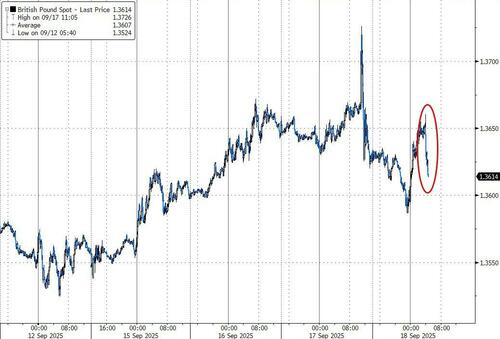
Cable Dips As BoE Holds Rates Steady (As Expected), Slows QT
The Bank of England held its key interest rate steady Thursday (as widely expected), just a day after the Fed cut borrowing costs for the first time in nine months.
Policymakers have lowered rates five times since August 2024, cutting at three-month intervals.
At the central bank’s last meeting two rounds of voting were required for the first time since the Monetary Policy Committee was launched 28 years ago, with MPC member Alan Taylor switching his vote to break a deadlock in favor of a quarter-point cut.
This time around, seven of the MPC’s nine members voted to hold rates steady, while two voted to cut borrowing costs by a quarter of a point.
will continue with a “cautious and gradual” approach to any future rate cuts – no change in the language there.
The BoE revealed that it will reduce its Asset Purchase Facility (APF) by a total £70 bn in the year October 2025 to September 2026 from a total £100 bn in the year just ending.
Of that, £53 bn will be through passive run-off (£87 bn this year) and £17 bn will be in active sales (£9.3 bn this year).
There was a three-way split on QT with Pill preferring the maintain the current pace of £100 bn/year (and hence a much faster pace of active sales).
Mann wanted a slower pace of £62 bn, which would have left active sales the same in the coming year as last.
The market reaction is largely muted for now with cable falling modestly on the statement. The FTSE 100 has ticked up from a lunchtime low, and gilt yields are ever so slightly down at the shorter end of the curve. Traders have slightly boosted easing bets.

The guidance from the BoE remains intact – interest rates are likely to drop further, but Governor Bailey said the moves would need to be made “gradually and carefully”.
The BoE said it remained focused on squeezing out existing and emerging inflation.
UBS notes that wage growth remains a key problem for the Bank of England:
The BoE’s base case is that UK wage growth will slow down, and from there, services sector inflation will slow. But it isn’t certain how long that process will take. Further, the BoE is concerned that the recent increase of inflation and the potential it rises further in September will actually put some upward pressure on wages. On top of that, it raised the prospect of higher food prices keeping headline inflation upwards.
In other words, while the core view is that wages and hence inflation will slow, there is a significant risk that assumption is wrong and quite the reverse happens with a low-level price/wage spiral occurring.
The broad view from the Committee was: “In general, upside risks around medium-term inflationary pressures remained prominent in the Committee’s assessment.”
The BoE noted that the labour market had loosened, but it wasn’t sure that sufficient slack had opened to mitigate inflationary pressures.
Finally, The BoE notes that trade policy uncertainty was estimated to have increased slightly since the Committee’s August meeting, albeit it was still significantly lower than earlier in the year. They note aspects of US tariff policies were facing domestic legal challenge in coming weeks.
Tyler Durden
Thu, 09/18/2025 – 07:50

















